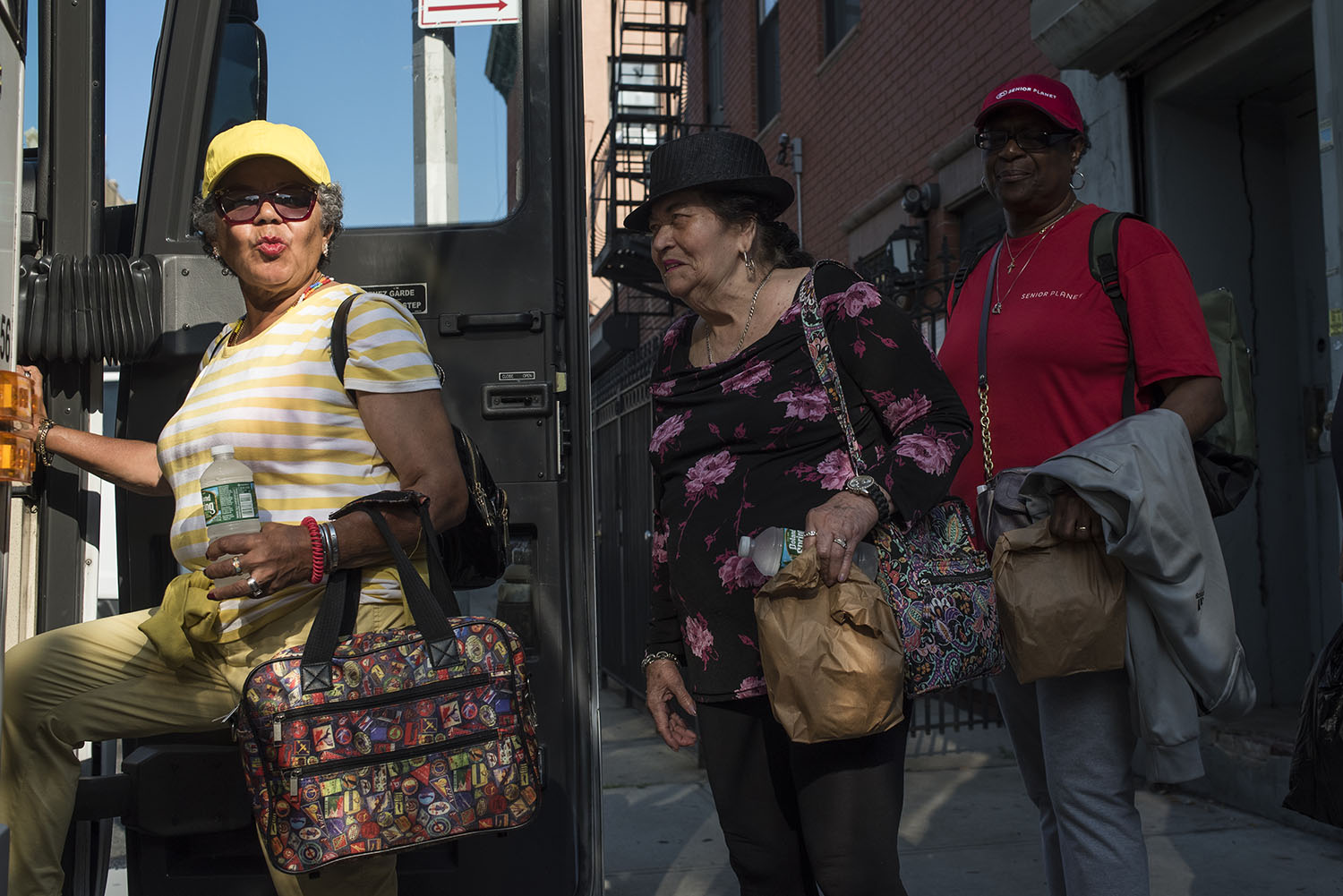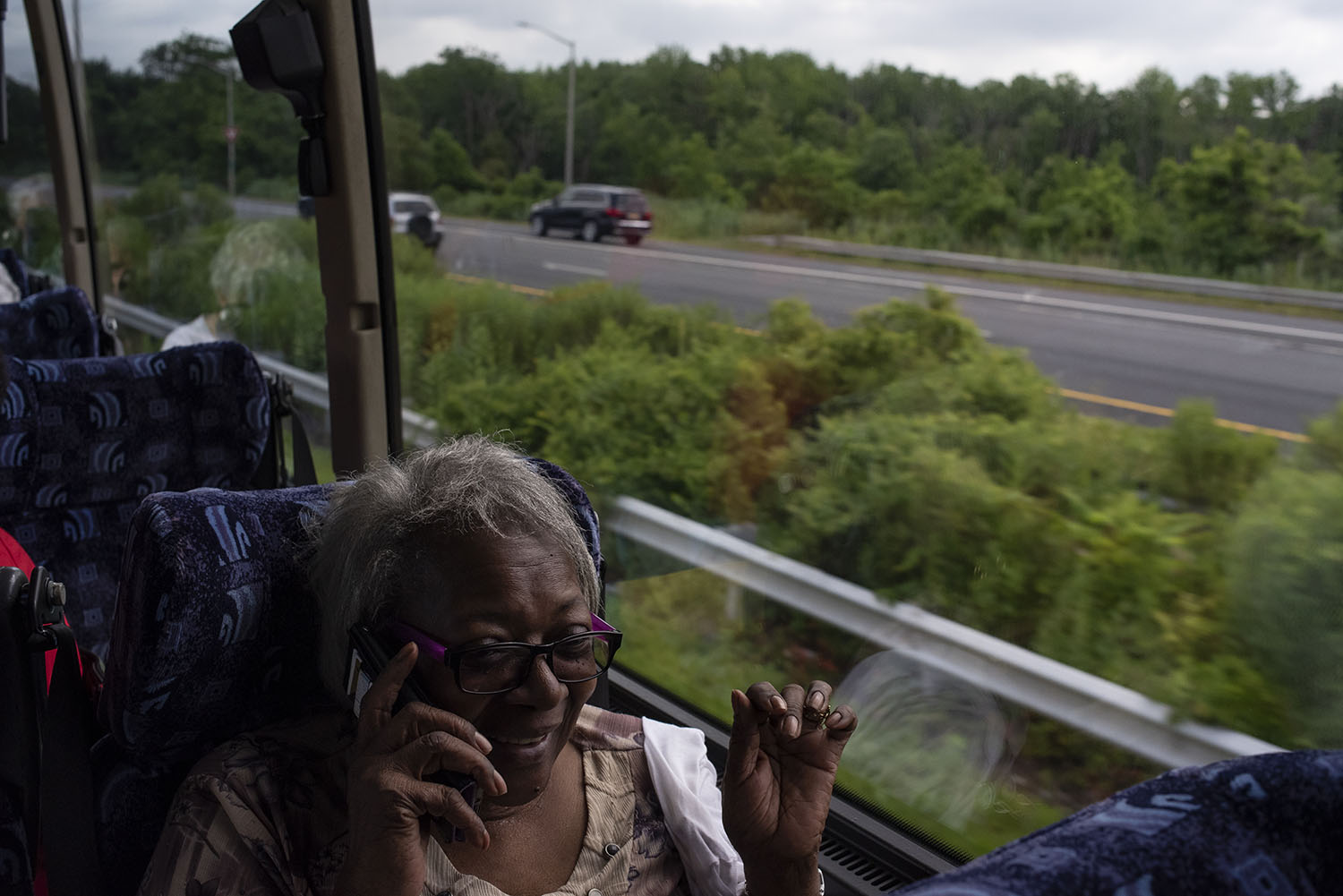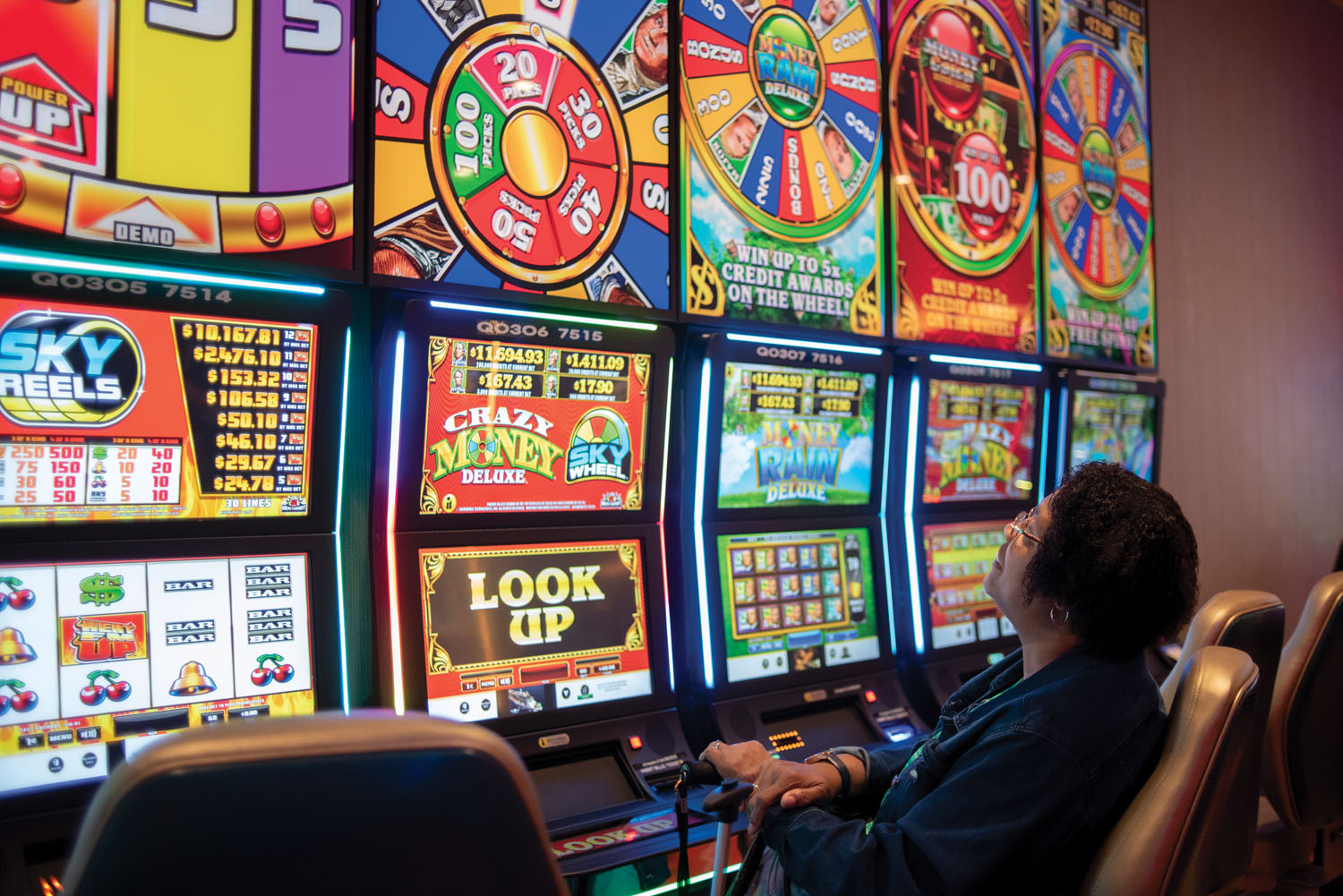1.

The Red Hook Neighborhood Senior Center was flooded out of its old spot near the public library, across from the barber shop and US Fried Chicken, by Hurricane Sandy in 2012. Last year the center finally moved into a renovated facility: modest, in the shadow of the Brooklyn-Queens Expressway. The entrance is flanked by concrete lions that have lost their features to time and weather; they could be sea lions.
By 8 a.m. we’ve gathered inside the cafeteria, ready to board the bus to Atlantic City. It’s Friday morning and the seniors are sashaying with coffee cups, primping, getting ready to party. Maria, the center’s program director, is calling off names on her list. Those who paid first board first. We get a bottle of water and a brown-bag lunch for the trip.
We board a bus reverberating with the sounds of forty-one seniors, most of them women, chattering and getting settled. Bags are hoisted into the overhead or shoved under seats, retrieved for a hat or glasses and tucked away again.
Using the bus’s PA system, Maria says a prayer for our safety, then goes through instructions for the day: Watch your money, don’t blow the rent on slots, listen up about when to meet back at the bus. Maria isn’t going to leave anyone behind, but she isn’t going to wait forever either.
Crossing the Verrazano Bridge, the jagged profile of the city falls away, sliding east. The bus smells like potato chips, like warm apples, like a school lunchroom. The bus has fake hardwood flooring, like a cheap apartment, and hard velvet seats. Maria comes down the aisle with a plastic bag for cash and a roll of red raffle tickets, two dollars each. Maria is no-bullshit, vivacious, the heart of the senior center, where, eight to four, five days a week, she keeps nearly a hundred seniors—mainstays of the neighborhood—fed, engaged, and entertained. Happy.
2.

“My hands are clean,” Juanita says, pulling a raffle ticket out of the bag, “I washed ’em yesterday.” Juanita’s got blue eye shadow and a shirt tucked into jeans. Her joke makes the rest of the seniors on the bus laugh and slap their thighs. Aretha Franklin over the bus’s PA system: “Your kisses / Sweeter than honey / But guess what? / So is my money.” Maria announces that we’ve collected fifty dollars for the driver.
I’ve lived in Red Hook for over a decade now. The gambling in delis that surround the Red Hook Houses is part of the music of the neighborhood: dominoes, off-track betting, lotto, scratch-offs. “It may be that people who live in disadvantaged neighborhoods do not see many role models of financial success achieved through conventional means.” So says John Welte of the University at Buffalo Clinical and Research Institute on Addictions who, along with his colleagues, conducted a study on poverty and gambling. Welte’s take sounds self-righteous and demeaning. The people on this bus have worked jobs, paid rent and taxes, and bought groceries each week. The rest of what Welte says makes some sense, though, if you take the “entitlements” taint out of it. It captures the tenacity of these seniors, despite a system designed to keep them on the shit end of the stick: “Gambling may be viewed as one of the few opportunities for financial advancement, and perhaps provides the lure as a means for easily gaining money.” Lady Luck, divine blessings, and the sheer physics of an economic vacuum attracting its fill. Why not throw down a couple dollars? What do you have to lose?
Queen Anne’s lace and chicory bob alongside Route 440. We see Atlantic City long before we reach it.
3.

Three hours out of Red Hook and the closest thing New Jersey has to Sin City glitters on the horizon. The Red Hook seniors shift in their plush seats, ready for the dollar bets and spinning cherries of the slot machines. BarBarBar, Cherry, $, Bell, BarBar.
At the casino, we each get a twenty-five dollar comp card, like all the other visiting groups. Some of the ladies attach the card to a spiral cord hooked to their belts or bags so they won’t lose it. They take turns taking selfies while they wait in line. Carmen, in yellow head to toe, teaches me her casino rituals: Play the comp card till you’re up, cash it out, hide your money, and don’t tell a soul what you win. “They’ll be jealous,” she says.
On the slots there’s a button that calls a waitress. The cheap coffee is endless. We lose track of the time. We grow accustomed to the overwhelming dings and jingles and the chime of fake change falling onto fake metal.
You know how all those wealthy, white old men are dying of loneliness in their single-family homes in the suburbs? Hanging out, even gambling, with the Red Hook seniors makes me think that they’re on to something. They’re not lonely, they’re too busy up in everybody else’s business. They check on each other, carry each other’s bags, swap food and jokes and recipes and gossip. They’ve weathered Hurricane Sandy, poverty, disability, death, discrimination, old age.
They’re more resilient than other demographic groups, which is something worth noting. Doctors talk about how some elders experience a “failure to thrive,” not engaging with the world around them. Maybe the lonely just need a week with this crowd.
On the ride home, Maria’s happy. She won, though she won’t say how much. She goes through roll call, making eye contact with each person on the list. The bus is quiet on the way back to Brooklyn. Some look tired, some read their phones, others sleep. Maria says into the bus’s PA system that a body was found at Coney Island that day. “Have fun in the water—enjoy the waves!” she says, and we all yell at her: “Ewwww!” But the hand of fate isn’t too far from anyone’s mind.
This dispatch is from #VQRTrueStory, our social-media experiment in nonfiction, which you can follow by visiting us on Instagram: @vqreview.








